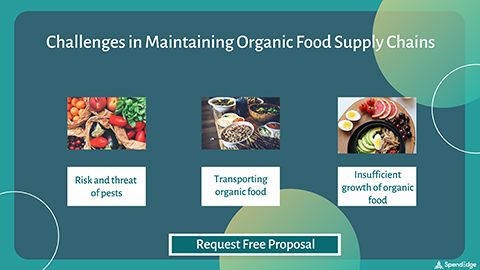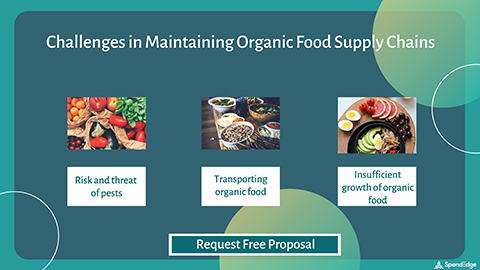LONDON--(BUSINESS WIRE)--SpendEdge, a leading provider of procurement market intelligence solutions, has announced the completion of their latest article on challenges in maintaining organic food supply chains.
With the rising popularity and demand for organic food, companies in the food and beverage industry are forced to adapt to industry demands and identify new ways of procuring and sourcing food products. They are faced with pressure to revamp their supply chains to keep pace with the retail sales of organic food products. Also, they need to revise their procurement strategies to cater to consumers and remain competitive.
At SpendEdge, we understand that the growth of the organic food market is not expected to slow down anytime soon. This article will help you better understand the challenges facing the organic food supply chains and strategize effectively.
Challenges in Maintaining Organic Food Supply Chains
Risk and threat of pests
Organic food supply chains rely on organic farming. They face unprecedented risks from pests and other crop destroying factors. Moreover, it is costly and time consuming for farmers to switch to organic farming. They can’t use prohibited substances and pesticides 36 months before the produce is grown, thereby reducing the number of organic farmers and suppliers that can meet industry demands.
Analyzing organic food supply chain risks is crucial for companies to address the rising demand from customers. Request free platform access to gain over 1000+ reports catering to different categories.
Transporting organic food
Transporting organic food products and keeping it separate from non-organic produce is one of the major challenges. Companies offering organic and non-organic food products have to use two different machines for each step of production to maintain organic food standards and practices. This increases production costs significantly. To gain comprehensive insights into the factors impacting the production costs , reach out to our experts now!
Insufficient growth of organic food
The seasonality of organic food crops makes it difficult for suppliers to meet supply chain demand. Companies have to collaborate with multiple suppliers from different regions to source items for one type of product. This leads to high import costs and complicates the supply chain.
To get more insights into the challenges faced by companies in maintaining organic food supply chains and ways to tackle them, request for more information.
You may also like:
- Global Perishable Goods Transportation Market - Procurement Intelligence Report
- 7 Benefits of Short Food Industry Supply Chains
- Reducing Average Lead Time Between Order Placement and Goods Readiness with Supply Chain Analysis for a Food Processing and Packaging Company
About SpendEdge:
SpendEdge shares your passion for driving sourcing and procurement excellence. We are the preferred procurement market intelligence partner for 120+ Fortune 500 firms and other leading companies across numerous industries. Our strength lies in delivering robust, real-time procurement market intelligence reports and solutions.
Request free proposal to know more, https://www.spendedge.com/request-free-proposal




